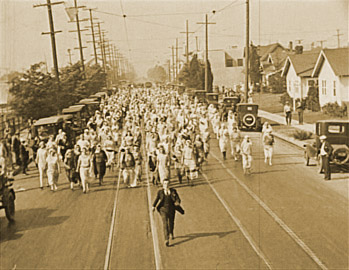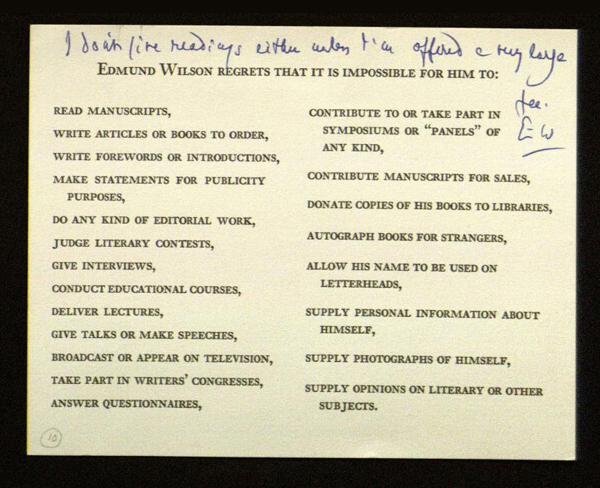Charles Laughton recites the Gettysburg Address in Ruggles of Red Gap, filmed in 1935:
(This is the latest in a weekly series of arts-related videos that appear in this space each Wednesday.)
Archives for January 2010
TT: Almanac
“There is no such thing as justice–in or out of court.”
Clarence Darrow (quoted in the New York Times, April 19, 1936)
TT: A great actor reads
Here is part of The Storyteller, the long-out-of-print 1961 Capitol LP that preserves a live performance of the one-man touring show in which Charles Laughton read from and talked about some of his favorite works of literature. In this pair of audio clips, Laughton reads an excerpt from Jack Kerouac’s The Dharma Bums, reminisces about his first visit to Chartres Cathedral, then reads Psalm 104.
The first part is here:
The second part is here:
TT: Almanac
“Happiness is one of the hardest things to write about, and the difficulty of doing so makes me long to be a musician or a painter, for painters and musicians are at ease with the supreme emotion, which is not grief but joy abounding. To be able to make a joyful noise unto the Lord or a praise of colors and forms would seem to me to equate any man with gods or little children. Happiness annihilates time. We measure history by its catastrophes, we recall the weather by its storms, but the periods of peace and joy–who can describe them?”
Hugh MacLennan, The Watch That Ends the Night
TT: Made it, Ma, front of the store!
Pops: A Life of Louis Armstrong was on sale today on the front rack of the New York Times Bookstore in the Delta terminal at LaGuardia Airport:

TT: Still and all
 Over the weekend I flew up to New York from Winter Park, Florida, and saw four shows in a row, David Ives’ Venus in Fur, Arthur Miller’s A View from the Bridge, the last installment of Horton Foote’s Orphans’ Home Cycle, and Donald Margulies’ Time Stands Still. I went straight to the airport from the theater after seeing Time Stands Still on Sunday afternoon and flew back to Florida. This week I’ll be teaching a class at Rollins College, writing two pieces, giving a pair of back-to-back lectures at the college on Thursday, doing four Pops-related radio interviews, and gearing up to start another writing project, the liner notes for Hilary Hahn‘s next album. On Friday my brother and sister-in-law arrive from Smalltown, U.S.A., for a weekend visit, in the course of which we’ll be seeing two more shows in Orlando.
Over the weekend I flew up to New York from Winter Park, Florida, and saw four shows in a row, David Ives’ Venus in Fur, Arthur Miller’s A View from the Bridge, the last installment of Horton Foote’s Orphans’ Home Cycle, and Donald Margulies’ Time Stands Still. I went straight to the airport from the theater after seeing Time Stands Still on Sunday afternoon and flew back to Florida. This week I’ll be teaching a class at Rollins College, writing two pieces, giving a pair of back-to-back lectures at the college on Thursday, doing four Pops-related radio interviews, and gearing up to start another writing project, the liner notes for Hilary Hahn‘s next album. On Friday my brother and sister-in-law arrive from Smalltown, U.S.A., for a weekend visit, in the course of which we’ll be seeing two more shows in Orlando.
In between these varied activities, I’ve been working on a new opera libretto and–brace yourself–a play. Yes, the play is a great big honking maybe, but we’ll see what, if anything, comes of it.
The good news, if you want to call it that, is that on Thursday evening I spent several hours undertaking the formidable task of planning my reviewing calendar through the beginning of September, and I went well out of my way to schedule in a two-week vacation. Mrs. T and I intend to go up the spout toward the end of May. I can’t wait.
 The two of us also managed to set aside a tiny bit of down time in Florida, enough to watch four movies on TV. Two of them, Kind Hearts and Coronets and Sunset Boulevard, were old favorites, while the others, Libeled Lady and Fritz Lang’s Man Hunt, were classics that I’d never seen. I even succeeded in reading a newish book, Preston Neal Jones’ Heaven and Hell to Play With: The Filming of The Night of the Hunter, and starting a novel that Mrs. T enthusiastically recommended to me, Dodie Smith’s I Capture the Castle. And the two of us took an hour off one afternoon and lunched on fabulously good chili dogs at Between the Buns, a wonderful Orlando joint that’s built in the shape of (logically enough) a giant hot dog.
The two of us also managed to set aside a tiny bit of down time in Florida, enough to watch four movies on TV. Two of them, Kind Hearts and Coronets and Sunset Boulevard, were old favorites, while the others, Libeled Lady and Fritz Lang’s Man Hunt, were classics that I’d never seen. I even succeeded in reading a newish book, Preston Neal Jones’ Heaven and Hell to Play With: The Filming of The Night of the Hunter, and starting a novel that Mrs. T enthusiastically recommended to me, Dodie Smith’s I Capture the Castle. And the two of us took an hour off one afternoon and lunched on fabulously good chili dogs at Between the Buns, a wonderful Orlando joint that’s built in the shape of (logically enough) a giant hot dog.
Jack, in short, is no kind of dull boy these days. But he sure is looking forward to that vacation come May–and maybe even spending a bit of time wandering aimlessly around Winter Park, a town of which I very much like the looks.
TT: Here’s how I’m feeling this week

Enough said?
TT: Almanac
“First, to speak favorably of whatever promising new work I am able to review within the limits of a monthly column. Second, not to speak unfavorably of what I do not like unless the artist has an established reputation. Third, not to hesitate to attack an inflated reputation. Fourth, to balance to claims of past and present. Fifth, to write for informed consumers, not producers, of art–on the theory that criticism has little reason to expect to influence an artist–who, if he is any good, knows what he is about–and much reason to hope to develop a sympathetic audience for quality in art, wherever it may appear.”
S. Lain Faison, Jr., “New Year’s Resolutions” (in Expressing Abstraction: Writings on Art for The Nation)
